Hyundai Staria vs Mitsubishi ASX – Differences & prices compared
Compare performance, boot space, consumption and price in one view.
Find out now: which car is the better choice for you – Hyundai Staria or Mitsubishi ASX?
The Hyundai Staria (Bus) comes with a Full Hybrid engine and Automatic transmission. In comparison, the Mitsubishi ASX (SUV) features a Petrol, Petrol MHEV or Full Hybrid engine with Manuel or Automatic transmission.
When it comes to boot capacity, the Hyundai Staria offers 831 L, while the Mitsubishi ASX provides 484 L – depending on how much space you need. If you’re looking for more power, decide whether the 225 HP of the Hyundai Staria or the 158 HP of the Mitsubishi ASX suits your needs better.
In terms of consumption, the values are 7.60 L per 100 km for the Hyundai Staria, and 4.40 L for the Mitsubishi ASX.
Price-wise, the Hyundai Staria starts at 42400 £, while the Mitsubishi ASX is available from 20600 £. Compare all the details and find out which model fits your lifestyle best!
Hyundai Staria
The Hyundai Staria stands out with its futuristic design, characterised by sleek lines and an expansive front grille that makes a bold statement on the road. Inside, it offers a spacious and versatile interior, providing a comfortable ride for both driver and passengers. This vehicle effortlessly combines practicality with a touch of luxury, appealing to families and professionals alike.
details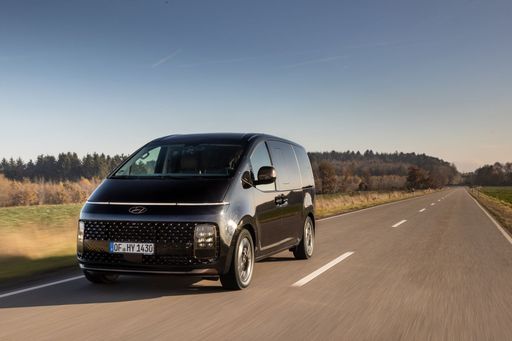 @ hyundai.news
@ hyundai.news
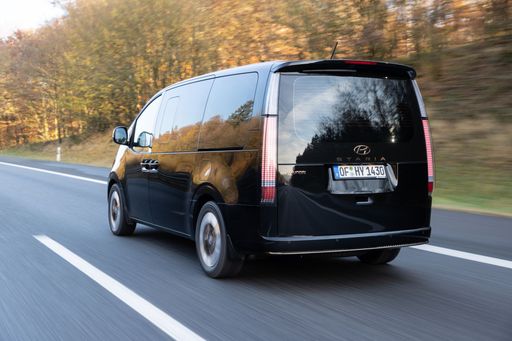 @ hyundai.news
@ hyundai.news
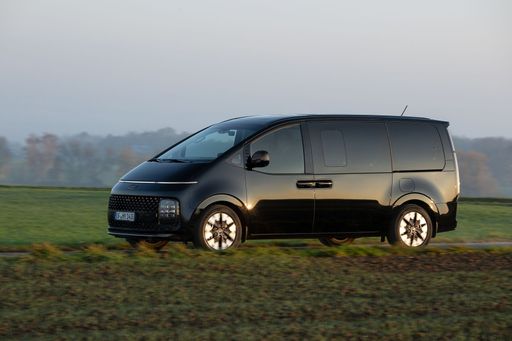 @ hyundai.news
@ hyundai.news
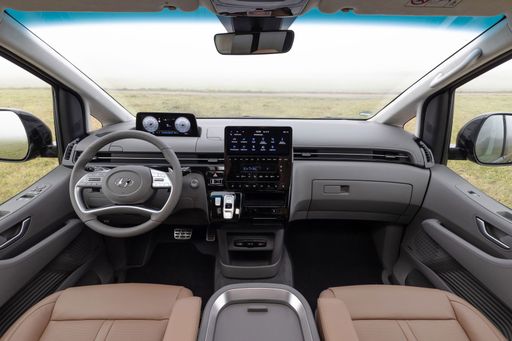 @ hyundai.news
@ hyundai.news
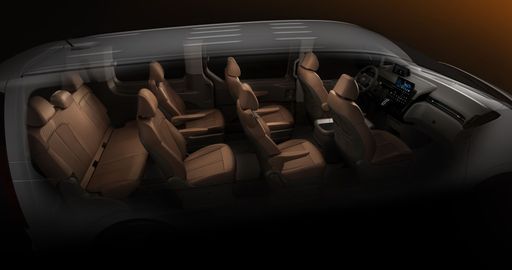 @ hyundai.news
@ hyundai.news
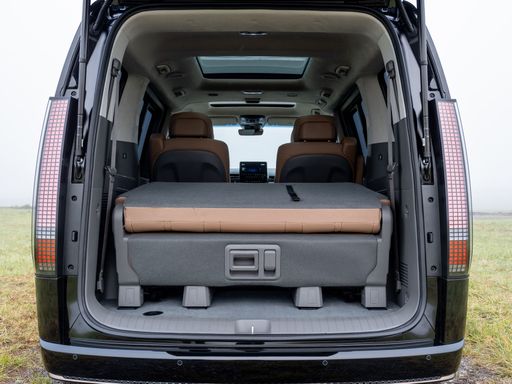 @ hyundai.news
@ hyundai.news
Mitsubishi ASX
The Mitsubishi ASX presents itself as a compact crossover that combines practicality with style. Its sleek design and versatile interior make it an appealing choice for both urban and rural settings. With a focus on providing a comfortable driving experience, the ASX also offers a range of modern features that enhance connectivity and safety.
details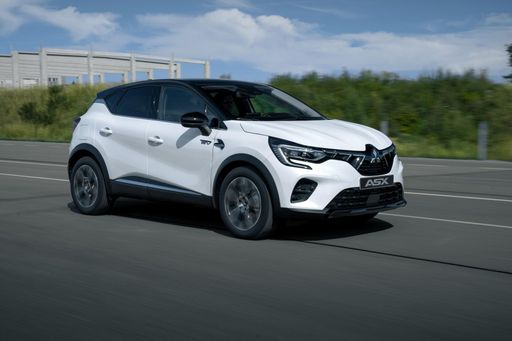 @ Mitsubishi
@ Mitsubishi
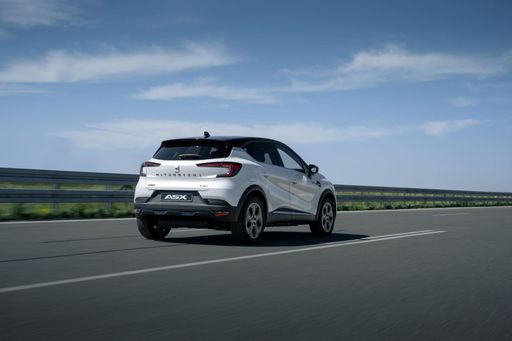 @ Mitsubishi
@ Mitsubishi
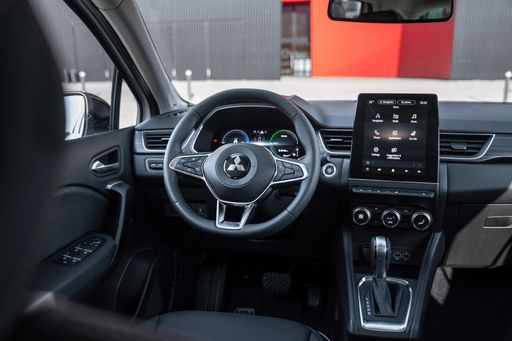 @ Mitsubishi
@ Mitsubishi
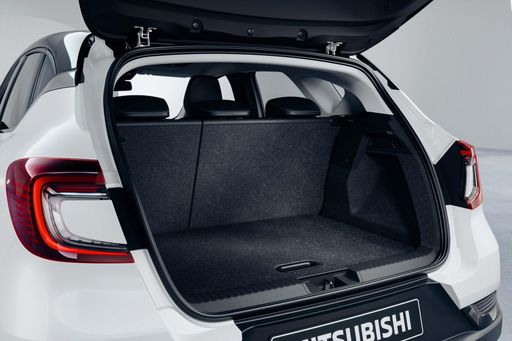 @ Mitsubishi
@ Mitsubishi

|

|
|
|
|
Costs and Consumption |
|
|---|---|
|
Price
42400 - 50500 £
|
Price
20600 - 32500 £
|
|
Consumption L/100km
7.60 L
|
Consumption L/100km
4.4 - 6 L
|
|
Consumption kWh/100km
-
|
Consumption kWh/100km
-
|
|
Electric Range
-
|
Electric Range
-
|
|
Battery Capacity
-
|
Battery Capacity
-
|
|
co2
172 g/km
|
co2
99 - 135 g/km
|
|
Fuel tank capacity
65 L
|
Fuel tank capacity
48 L
|
Dimensions and Body |
|
|---|---|
|
Body Type
Bus
|
Body Type
SUV
|
|
Seats
7 - 9
|
Seats
5
|
|
Doors
5
|
Doors
5
|
|
Curb weight
2275 - 2345 kg
|
Curb weight
1296 - 1493 kg
|
|
Trunk capacity
117 - 831 L
|
Trunk capacity
348 - 484 L
|
|
Length
5253 mm
|
Length
4239 mm
|
|
Width
1997 mm
|
Width
1797 mm
|
|
Height
1990 mm
|
Height
1575 mm
|
|
Payload
605 - 775 kg
|
Payload
397 - 449 kg
|
Engine and Performance |
|
|---|---|
|
Engine Type
Full Hybrid
|
Engine Type
Petrol, Petrol MHEV, Full Hybrid
|
|
Transmission
Automatic
|
Transmission
Manuel, Automatic
|
|
Transmission Detail
Automatic Gearbox
|
Transmission Detail
Manual Gearbox, Dual-Clutch Automatic, Automatic Gearbox
|
|
Drive Type
Front-Wheel Drive
|
Drive Type
Front-Wheel Drive
|
|
Power HP
225 HP
|
Power HP
91 - 158 HP
|
|
Acceleration 0-100km/h
10.20 s
|
Acceleration 0-100km/h
8.5 - 14 s
|
|
Max Speed
167 km/h
|
Max Speed
168 - 180 km/h
|
|
Torque
367 Nm
|
Torque
160 - 270 Nm
|
|
Number of Cylinders
4
|
Number of Cylinders
3 - 4
|
|
Power kW
165 kW
|
Power kW
67 - 116 kW
|
|
Engine capacity
1598 cm3
|
Engine capacity
999 - 1789 cm3
|
General |
|
|---|---|
|
Model Year
2024
|
Model Year
2024 - 2025
|
|
CO2 Efficiency Class
F
|
CO2 Efficiency Class
D, C
|
|
Brand
Hyundai
|
Brand
Mitsubishi
|
Hyundai Staria
A Bold New Horizon: The Hyundai Staria
The Hyundai Staria is redefining the landscape of family vehicles, blending technological innovation with exceptional design. As a groundbreaking multi-purpose vehicle (MPV), it offers a unique balance of style, comfort, and performance. This article delves into the impressive technical details and cutting-edge features that elevate the Staria above its peers.
Cutting-Edge Design & Spacious Comfort
The first thing you’ll notice about the Hyundai Staria is its futuristic design. With a length of 5253 mm, a width of 1997 mm, and a height of 1990 mm, the Staria stands out with its imposing presence. Its sleek silhouette is complemented by wide panoramic windows that enhance visibility and give passengers a sense of space, further underscored by a class-leading interior height.
The Staria is available in configurations that can accommodate between seven to nine seats, offering flexibility for families and businesses alike. Additionally, it boasts a spacious boot with 117 to 831 litres of cargo space, ensuring ample room for luggage and more.
Powertrain and Performance
Under the bonnet of the Hyundai Staria lies a robust 2.2 CRDi diesel engine. Generating an impressive 177 PS (130 kW) and a maximum torque of 430 Nm, this 4-cylinder engine provides strong and consistent performance. It is paired with an automatic transmission that ensures smooth gear shifts, available in both all-wheel and front-wheel drive configurations.
The Staria delivers on efficiency too, with fuel consumption ranging from 8.5 to 8.9 litres per 100 km. It accelerates from 0-100 km/h in 12.4 to 13.5 seconds, with a top speed between 180 to 185 km/h, making it a versatile choice for city and highway driving alike.
Advanced Safety and Technology
Hyundai has packed the Staria with an array of advanced safety features. From intelligent driver assistance systems to cutting-edge connectivity options, the Staria ensures that both driver and passengers are protected and entertained. With its CO2 efficiency class rated at G and CO2 emissions ranging from 222 to 232 g/km, it strikes a balance between performance and environmental considerations.
Conclusion: More Than Just a Vehicle
The Hyundai Staria is more than a mode of transport; it represents a new era in vehicle design and functionality. With prices ranging from €48,100 to €59,600, it provides consumers with a wide array of premium features typically associated with higher-end models. Whether for family adventures or business needs, the Staria assures a drive defined by comfort, innovation, and style.
The Staria sets a new benchmark in the MPV sector, offering a glimpse into the future of automotive versatility and sophistication.
Mitsubishi ASX
The Mitsubishi ASX: A Modern SUV with Advanced Features
The Mitsubishi ASX continues to be a popular choice for SUV enthusiasts, combining sleek design, impressive efficiency, and innovative technology. The 2024 model year introduces an array of improvements, making it a worthy contender in its category. In this article, we will delve into the technical details and innovative aspects of the Mitsubishi ASX, presenting why it stands out in the SUV segment.
Sophisticated Powertrains and Efficiency
Under the bonnet, the Mitsubishi ASX offers a variety of powertrain options, catering to different driving preferences. Customers can choose from petrol engines, mild-hybrid systems, and full-hybrid configurations, balancing power and efficiency effectively.
The performance spectrum ranges from 91 PS to 158 PS, demonstrating the vehicle's versatility. With a fuel consumption of between 4.7 and 6 L/100km, the ASX effectively manages fuel efficiency without compromising on performance. The car's CO2 emissions range from 107 to 135 g/km, placing it within CO2 efficiency classes C and D.
Advanced Transmission Options
The ASX offers a mixture of manual and automatic transmissions to meet diverse driving needs. Its gearbox specifications include a standard manual option and automatic options such as dual-clutch transmissions, providing a seamless driving experience. Depending on the variant, the vehicle can accelerate from 0 to 100 km/h in as little as 8.5 seconds, reaching maximum speeds between 168 and 180 km/h.
Modern Design and Spacious Interior
Externally, the ASX reflects contemporary design aesthetics, with dimensions of 4239 mm in length, 1797 mm in width, and 1575 mm in height. Internally, it accommodates up to five passengers comfortably and offers a respectable boot capacity ranging from 348 to 484 litres. Despite its spaciousness, the SUV maintains an optimal weight between 1296 and 1501 kg, which aids in delivering its intended driving dynamics.
Safety and Technology Innovations
Mitsubishi prioritises safety and technology in the ASX. It is equipped with the latest driver-assistance systems, enhancing safety and convenience. The modern infotainment system integrates smoothly with smartphones, ensuring that connectivity is at the driver's fingertips. Moreover, various trimming levels such as "Intro Edition DCT" and "Top Automatik" allow customers to select features best suited to their lifestyle, from basic utilities to luxury enhancements.
Conclusion: A Balanced SUV Choice
The Mitsubishi ASX stands out as a well-rounded SUV choice for those who prioritise efficiency, reliability, and modern technology. Its array of powertrains, stylish design, and advanced safety features make it an attractive option within its price range of €23,990 to €37,390. The ASX's 2024 model reaffirms Mitsubishi’s commitment to offering innovative yet practical vehicles to the global market.
Which drive types are available for the Hyundai Staria?
Available as Front-Wheel Drive.
The prices and data displayed are estimates based on German list prices and may vary by country. This information is not legally binding.
